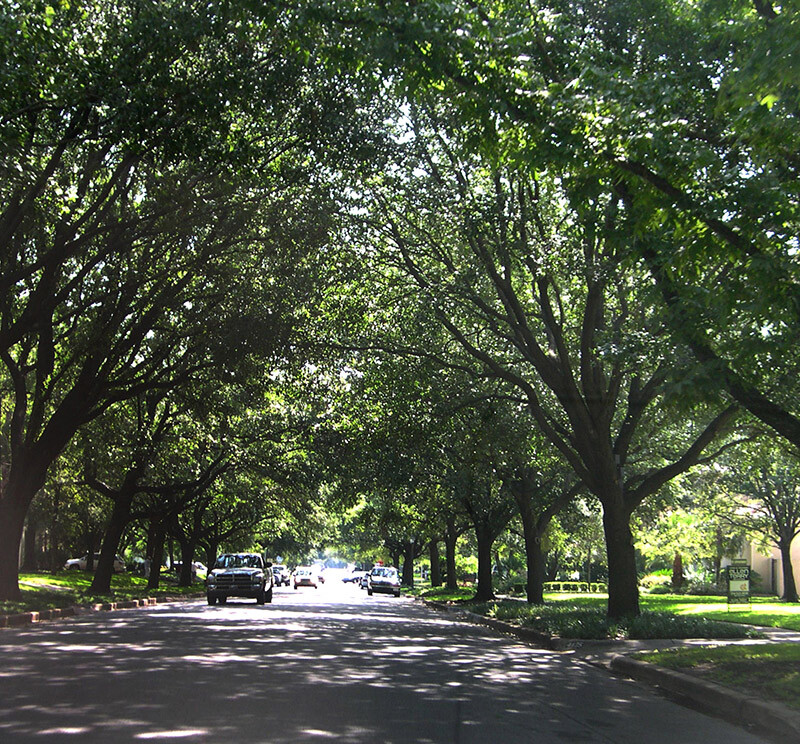
Dallas Park Land and Tree Ordinances Need Clarity and Refinement Ahead of Council Vote
The Dallas City Council on May 16 heard separate proposals concerning a new Park Land Dedication Ordinance and revisions to Article X which concerns tree planting and conservation. A vote on each is expected before the council’s July recess.
My personal involvement on the tree ordinances dates back to 2009 when the Association began to talk with stakeholders about possible improvements. Article X has created challenges for new development, especially in South Dallas. The premise of the ordinance is to assign fees to the removal of trees on private property. Property owners can attempt to reduce or eliminate fees by preserving the existing tree canopy, replanting desirable trees using best practice methods and other sustainable development methods.
The new draft of Article X does provide property owners with more carrots, but it also adds more sticks and lacks transparency on key items such as the fees and how they are used. Another problem is that the ordinance now assigns a mitigation fee to nuisance trees such as Hackberries and thorn-ridden Mesquite trees, albeit at a lower rate than others. Hackberries are found in large numbers on property throughout Dallas, meaning that several small fees add up to one large fee when it comes time to remove them. The larger a Hackberry grows, the more brittle and dangerous it becomes. Their leaves attract aphids that drip honeydew on everything below. Eventually, black sooty mold grows on the honeydew. In other words, a Hackberry has no redeeming qualities. The Dallas BA is proposing a measure that allows property owners to remove smaller, less desirable species, defined as Class 3 trees in the ordinance, without paying a fee.
Article X currently lacks the credit for new replacement trees now required by state law. House Bill 7, which became effective in December, was supported by the City of Dallas and the Dallas Builders Association in the most recent legislative session. By focusing on credit for planting replacement trees, we felt this was a better alternative to more aggressive proposals that sought to remove municipal authority from tree preservation entirely. The proposed changes to Article X outline the process that, in most cases, should achieve the result state law allows. However, inclusion of language from the statute would guarantee property owners no worse than the outcome provided for by the legislature.
Our final concerns with Article X deal with transparency. First and foremost, the fees are not even published in the ordinance! Instead, there is a reference made to the Guide for Establishing Values of Trees and Other Plants. This book, available for $130 on Amazon, assigns prices determined by a national group of arborists. Just as they would with any other measure affecting them, property owners or those considering the purchase of property in Dallas should look no further than the ordinance itself to evaluate its impact on them.
Concerns about the lack of transparency on the fees are heightened by the fact that Dallas has more than $7 million dollars sitting in its Reforestation Fund that is not being used for reforestation! The ordinance revisions simply add administrative expenditures for the fund. An ordinance that asks property owners to do their part, but doesn’t require Dallas to uphold their end of the bargain, is not something we can support. There are plenty of non-profit organizations such as the Texas Trees Foundation that could use those funds efficiently and effectively. Unused reforestation funds would also go a long way towards meeting the city’s park land goals.
The premise of the Park Land Dedication ordinance is that the city may take a portion of private property, without compensation, through dedication or by extracting a fee. Unfortunately, the public is being led to believe the ordinance will provide them a park within ten minutes walking distance. Instead, it is intended to add and upgrade the system for future residents since they are the ones ultimately paying for it.
The lack of an ordinance has not led to any deficiencies in the city’s parks system. Blame for that resides on Marilla Street. Developing and maintaining parks, trails and green space are functions inherent to any local government. Revenue from property taxes, voter-approved bond funding and tremendous support from private organizations and individuals provide Dallas with tools needed to accomplish this purpose. Many of the city’s existing parks were built or expanded by developers on their own volition, but the city has fallen behind on maintenance and upgrades.
Concern about aspects of the ordinance from the Dallas Builders Association and other industry groups does not mean developers are opposed to parks. Many of our concerns come from experience with surrounding cities. They unapologetically use these ordinances to artificially drive up the cost of housing and deprive the opportunity of new homeownership to low and moderate income families.
Some Dallas council members contend that waiving or reducing park dedication fees for affordable housing will deprive low income individuals of parks. They fail to comprehend the basic economic premise that you cannot build affordable housing by making housing less affordable. Waiving fees for affordable housing does not waive parks. Dallas’s commitment to affordable housing cannot come as an unfunded mandate to property owners. The city, and the Mayor in particular, has proven to be a willing partner on these ventures.
Our members would rather build parks than pay fees and the ordinance should clearly encourage this. Whether you’re buying land to build your personal home or 100 homes, you need certainty on what it will cost you to make it happen.
With the vast majority of development potential in South Dallas, there is much to gain or potentially lose from each of these ordinances. With a bit more refinement they will encourage responsible development and add to our city’s incredible parks system without compromising housing affordability. View the Dallas BA’s letters to the Dallas City Council Park Land Dedication ordinance and Article X.